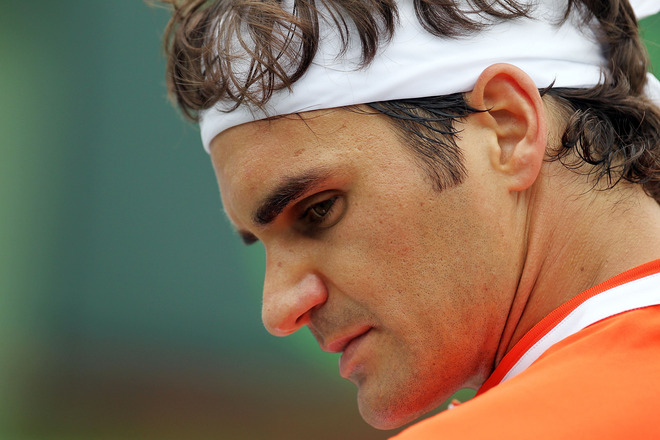By Randy Walker
Who is Tomas Berdych?
That was the refrain from many people at the 2004 Olympic Games in Athens, Greece when a 19-year-old Berdych, an relative unknown to almost anyone outside of Czech tennis circles, provided one of the biggest upsets in Olympic tennis history when he shocked world No. 1 and two-time Wimbledon champion Roger Federer 4-6, 7-5, 7-5 in the second round of the Games
The loss was devastating for Federer as it ended his hopes for an Olympic gold medal, one of the highest goals of his career. (He since went on to win Olympic doubles gold four years later in Beijing).
Since their debut meeting in Athens in 2004, Federer and Berdych have played eight more times, Federer winning all matches entering Tuesday night’s round of 16 match-up at the Sony Ericsson Open. Their last meeting was also an epic, a 4-6, 6-7 (4), 6-4, 6-4, 6-2 Federer win in the round of 16 at the 2009 Australian Open.

Rene Stauffer, author of THE ROGER FEDERER STORY: QUEST FOR PERFECTION ($24.95, New Chapter Press, www.RogerFedererBook.com) takes readers back to Federer’s Olympic experience in 2004 in this book excerpt below;
In Cincinnati, Federer lost in surprising fashion in the first round to Dominik Hrbaty of Slovakia, ending his 23-match winning streak. The winning streak was the longest in professional tennis in five years and the loss was Federer’s first in the opening round of a tournament since the French Open in 2003—a stretch of 15 months.
Federer, however, was quick to see the positive side of his early defeat —it gave him more time to prepare for the Olympic Games. The two-time Wimbledon champion was the star of the Swiss Olympic delegation and was considered certain to bring home a medal. He was highly motivated and he talked for months of the importance the trip to Greece was for him. Said Federer, “I’ve been looking forward to this tournament for four years.” He said he dreamed of winning the gold medal and toasting to his victory—and to his partnership with Mirka, which, like the Olympic flame, was ignited under the Olympic flag four years earlier at the Sydney Games. After his disappointing loss to Arnaud DiPasquale of France in the bronze medal match in Sydney, Federer was especially motivated to step on the medal podium.
He lived modestly in the Olympic Village—in contrast to many other tennis professionals who preferred hotels. He received the honor of leading the entire Swiss Olympic delegation as the Swiss flag-bearer at the Opening Ceremonies. Yet, like most of the tennis players at the Opening Ceremonies, he stood out in the enormous mass of athletes from all around the world, who sacrificed much through the years for this one chance at glory. While many athletes soaked in the atmosphere of the Opening Ceremonies from the infield of the Olympic stadium, Federer found himself forced to entertain a constant stream of photograph and autograph requests from his fellow Olympic athletes.
The International Tennis Federation was charmed that Federer held the Olympic tournament in such high esteem. Many Olympic followers and representatives from different Olympic sports held the opinion that the highly-paid professional tennis players had no business at the Olympics (tennis had once again became an Olympic sport in 1988) and that they did not take the event as seriously as it deserved to be treated.
In an Olympic tennis competition that featured many surprises, Federer’s second-round loss to the unknown 19-year-old Czech Thomas Berdych was perhaps the most unexpected result. To make matters worse, hours after his devastating 4-6, 7-5, 7-5 loss to the No. 79-ranked Berdych, he was also eliminated from the doubles competition with partner Yves Allegro, losing to India’s Leander Paes and Mahesh Bhupathi.
Federer’s losses were major disappointments not only to himself, but to the Swiss Olympic delegation, which received another medal blow on the same day when its medal-contending judo athlete Sergei Aschwanden, also was eliminated from medal contention. Federer appeared well-composed in the media center—but he was at a loss for an explanation. He said he felt somewhat pressured and was tired after the long season, it was difficult playing against a young player like Berdych whom he didn’t know. A few months later and viewing his Olympic experience with some perspective, he quipped, “At least I carried the flag well in Athens.”
